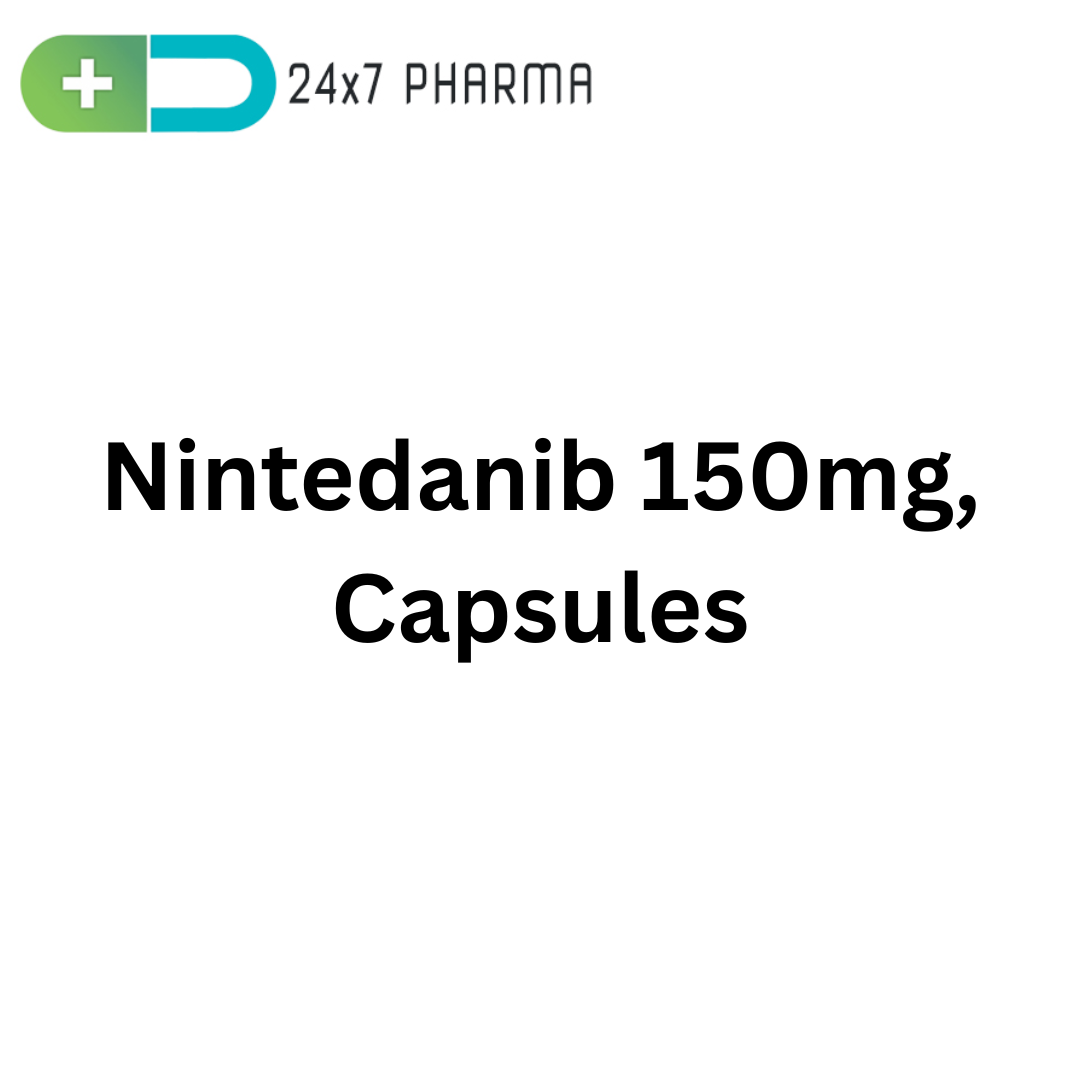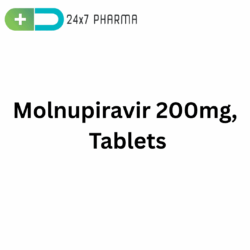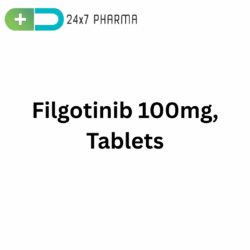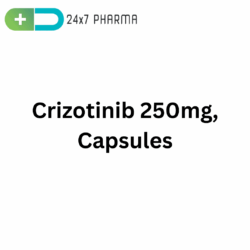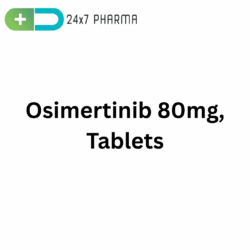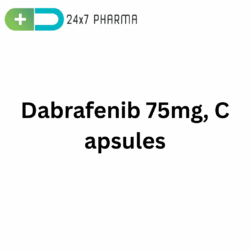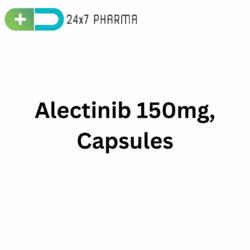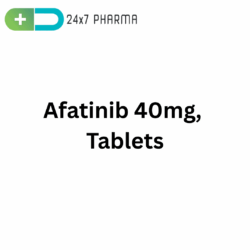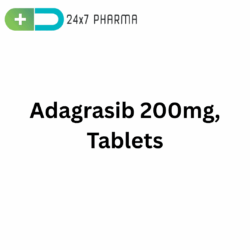Nintib 150mg, Nintedanib Capsules
Nintedanib, a strong tyrosine kinase inhibitor (TKI), is an ingredient in the prescription drug Nintib 150mg. It is primarily used to manage idiopathic pulmonary fibrosis (IPF) and other progressive fibrosing interstitial lung diseases (ILDs). It also plays a role in treating non-small cell lung cancer (NSCLC) in certain cases. Manufactured in capsule form, Nintib helps reduce disease progression and lung function decline.
What is Nintib 150mg?
Nintib 150mg is a targeted therapy classified under antifibrotic agents. Each capsule contains 150mg of Nintedanib, designed for oral administration. Nintedanib is known for its multi-kinase inhibitory action, making it useful in slowing down fibrosis (scarring of tissue) and inhibiting cancer cell growth in specific types of lung cancers.
How Does Nintib Work? (Mechanism of Action)
Nintedanib functions by blocking many receptor tyrosine kinases (RTKs) that contribute to tumor development and fibrosis. These include:
- Platelet-derived growth factor receptors (PDGFR)
- Fibroblast growth factor receptors (FGFR)
- Vascular endothelial growth factor receptors (VEGFR)
By blocking these pathways, Nintedanib interferes with the activity of cells involved in the formation of scar tissue in the lungs and limits blood supply to tumors. This mechanism helps:
- Slow down lung tissue scarring in IPF and other ILDs.
- Suppress tumor angiogenesis and growth in NSCLC.
How to Use / Indications
Nintib 150mg is indicated for:
- Idiopathic Pulmonary Fibrosis (IPF): a long-term, progressive lung condition that results in lung tissue scarring (fibrosis).
- Progressive Fibrosing Interstitial Lung Diseases (PF-ILD): For patients experiencing progression despite treatment.
- Systemic Sclerosis-Associated ILD (SSc-ILD): To manage lung involvement in scleroderma.
- Non-Small Cell Lung Cancer (NSCLC): In combination with docetaxel for locally advanced or metastatic adenocarcinoma after first-line chemotherapy.
How to Take / Dosage
Usual Dosage for Adults:
150 mg twice daily, approximately 12 hours apart, with food.
Administration Tips:
- Swallow capsules whole with water.
- Do not crush or chew.
- Take at the same times each day to maintain a steady blood level.
Other Dosage Considerations
Dose adjustments may be required if:
- The patient experiences adverse effects (e.g., diarrhea, liver enzyme elevation).
- Hepatic impairment: avoid in moderate to severe instances; use cautiously in mild cases (Child-Pugh A).
- Missed Dose: Skip and resume at the next scheduled time. Do not double dose.
- Lower dosage: May be reduced to 100 mg twice daily if 150mg is not well-tolerated.
Side Effects
Common side effects include:
- Abdominal discomfort, nausea, vomiting, diarrhea, and appetite loss are examples of digestive problems.
- Liver enzyme elevation: Monitor ALT, AST.
- Headache
- Weight loss
- Fatigue
- Elevated blood pressure
Serious side effects may include:
- Liver toxicity
- Gastrointestinal perforation
- Bleeding risk
- Thromboembolic events (blood clots)
- Monitoring: Regular liver function tests and blood pressure checks are necessary.
Storage
- Store Nintib capsules below 30°C.
- Keep in original packaging to protect from moisture.
- Keep out of reach of children.
- Do not use beyond the expiry date printed on the label.
Benefits of Nintib 150mg
- Slows IPF progression by reducing fibrosis formation.
- Preserves lung function over time.
- Reduces frequency of acute exacerbations in patients with ILDs.
- enhances survival and quality of life in certain situations.
- In cancer therapy, it enhances effectiveness when combined with chemotherapy.
Prescription
Nintib 150mg is a prescription-only medication and should be used under specialist supervision. It’s essential to get evaluated by a pulmonologist or oncologist before initiating therapy.
Drug Interactions
- Major Interactions: P-glycoprotein inhibitors (e.g., ketoconazole) and inducers (e.g., rifampicin) can affect Nintedanib levels.
- Anticoagulants (e.g., warfarin) – increases bleeding risk.
- CYP3A4 inhibitors may change how the medication is metabolized.
- NSAIDs or corticosteroids – monitor closely due to increased GI side effects.
Avoid:
- Alcohol (may increase liver toxicity)
- Herbal supplements unless approved by a physician
FAQs
How long can I take Nintib?
As prescribed by your doctor – often long-term to manage fibrosis progression.
What if I miss a dose?
Skip it and take the next scheduled dose. Do not double dose.
Can elderly patients take Nintib?
Yes, but with close monitoring due to higher risk of side effects.
What dietary precautions should I take?
Take with food to reduce nausea. Stay hydrated, especially if experiencing diarrhea.
Conclusion
Nintib 150mg (Nintedanib) is a powerful antifibrotic and antiangiogenic drug that has transformed the management of chronic fibrosing lung conditions like IPF and other ILDs, and also contributes to lung cancer therapy in specific settings. Its dual-action mechanism, targeting both fibrosis and angiogenesis pathways, makes it a vital treatment option.
However, its use demands careful medical supervision, regular monitoring, and adherence to dosing guidelines to ensure maximum therapeutic benefit while minimizing side effects. Patients should always communicate openly with their healthcare providers regarding symptoms, side effects, and any co-medications being taken.

